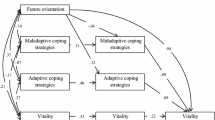Abstract
Using a sample of Chinese college students (n = 216), the present study showed that future-oriented coping negatively correlated with perceived pressure and positively correlated with successful job hunting. The relationship between proactive coping and preventive coping was also explored. Structural equation modeling suggested that a sequence model was better than a parallel model; that is, proactive coping mediated the effect of preventive coping on perceived pressure and successful job hunting. They are sequential stages of one process rather than two separate processes. Students’ appraisal of job hunting and their preparing and hunting behaviors were also investigated.
Similar content being viewed by others
References
AKAIKE, H. (1973). Information theory as an extension of the maximum likelihood principle. In V. Petrov & F. Csaki (Eds.), Second international symposium on information theory (pp. 267–265). Budapest: Akailseoniai Kiudo.
ASPINWALL, L. G., & TAYLOR, S. E. (1997). A stitch in time: Self-regulation and proactive coping. Psychological Bulletin, 121, 417–436.
BROWN, D. J., COBER, R. T, & KANE, K. (2007). Proactive personality and the successful job search: A field investigation with college graduates. Journal of Applied Psychology, 91, 717–734.
CAPLAN, R. D., VINOKUR, A. D., PRICE, R. H., & VAN, R. M. (1989). Job hunting, reemployment, and mental health: A randomized field experiment in coping with job loss. Journal of Applied Psychology, 74, 759–770.
COHEN, S., KAMARCK, T., & MERMELSTEIN, R. (1983). A global measure of perceived stress. Journal of Health and Social Behavior, 24, 385–396.
FENG, J. H. (2003). College grads feel a chill in the employment market. Beijing Review, 46(8), 16.
FOLKMAN, S., & MOSKOWITZ, J. T. (2004). Coping: Pitfalls and promise. Annual Review of Psychology, 55, 745–774.
GAN, Y., YANG, M., ZHOU, Y., & ZHANG, Y. (2007). The two-factor structure of future-oriented coping and its mediating role in student engagement. Personality and Individual Differences, 43, 851–863.
GAN, Y., HU, Y., & ZHANG, Y. (2010). Proactive and preventive coping in adjustment to college. Psychological Record, 60, 643–658.
GREENGLASS, E., SCHWARZER, R., JAKUBIEC, S. D., FIKSENBAUM, L., & TAUBERT, S. (1999, July). The Proactive Coping Inventory (PCI): A multidimensional research instrument. Paper presented at the 20th International Conference of the Star (Stress and Anxiety Research Society), Cracow, Poland.
HEPPNER, P. P., NEAL, G. W., & LARSON, L. M. (1984). Problem-solving training as prevention with college students. The Personnel and Guidance Journal, May, 514–519.
HU, L., & BENTLER, P. M. (1999). Cutoff criteria for fit indexes in covariance structure analysis: Conventional criteria versus new alternatives. Structural Equation Modeling, 6, 1–5.
KEENAN, A., & SCOTT, R. S. (1985). Employment success of graduates: Relationships to biographical factors and job-seeking behaviors. Journal of Occupational Behavior, 6, 305–311.
LAZARUS, R. S., & FOLKMAN, S. (1984). Stress appraisal and coping. New York: Springer.
LAZARUS, R. S., & FOLKMAN, S. (1987). Transactional theory and research on emotions and coping. European Journal of Personality, 1, 141–169.
LEE, C. K. (2007). Emotional intelligence and coping skills as predictors of counselor self-efficacy with genetic counseling graduate students (Doctoral dissertation, University of Minnesota). Retrieved from http://gateway.proquest.com/openurl%3furl_ver=Z39.88–2004%26res_dat=xri:pqdiss%26rft_val_fmt=info:ofi/fmt:kev:mtx:dissertation%26rft_dat=xri:pqdiss:3227
LEVINSON, D. J. (1978). The seasons of a man’s life. New York: Ballantyne.
MAXWELL, S. E., & COLE, D. A. (2007). Bias in cross-sectional analyses of longitudinal mediation. Psychological Methods, 12, 23–44.
MCCARTHY, C. J., & Lambert, R. G. (1999). Structural model of coping and emotions produced by taking a new job. Journal of Employment Counseling, 36, 50–66.
OUWEHAND, C., DE RIDDER, D. T. D., & BENSING, J. M. (2008). Individual differences in the use of proactive coping strategies by middle-aged and older adults. Personality & Individual Differences, 45, 28–33.
ROESCH, S. C., ALDRIDGE, A. A., HUFF, T. L. P., LANGNER, K., VILLODAS, F., & BRADSHAW, K. (2009). On the dimensionality of the Proactive Coping Inventory: 7, 5, 3 factors? Anxiety, Stress & Coping, 22, 327–339.
SCHWARZER, R., & KNOLL, N. (2003). Positive coping: Mastering demands and searching for meaning. In S. J. Lopez & C. R. Snyder (Eds.), Positive psychological assessment: A handbook of models and measures (pp. 393–409). Washington, DC: American Psychological Association.
SCHWARZER, R., & TAUBERT, S. (2002). Tenacious goal pursuits and striving toward personal growth: Proactive coping. In E. Fydenberg (Ed.), Beyond coping: Meeting goals, visions and challenges (pp. 19–35). London: Oxford University Press.
SOHL, S. J., & MOYER, A. P. (2009). Refining the conceptualization of a future-oriented self-regulatory behavior: Proactive coping. Personality & Individual Differences, 47, 139–144.
STEVENS, N. D. (1973). Job-seeking behavior: A segment of vocational development. Journal of Vocational Behavior, 3, 209–219.
SUPER, D. E. (1983). Assessment in career guidance: Toward truly developmental counseling. The Personnel and Guidance Journal, May, 555–562.
SUPER, D. E, & HALL, D. T. (1978). Career development: Exploration and planning. Annual Review of Psychology, 29, 333–372.
WANBERG, C. R., WATT, J. D., & RUMSEY, D. J. (1996). Individuals without jobs: An empirical study of job-seeking behavior and reemployment. Journal of Applied Psychology, 81, 76–87.
WANBERG, C. R. (1997). Antecedents and outcomes of coping behaviors among unemployed and reemployed individuals. Journal of Applied Psychology, 82, 731–745.
YANG, T., & HUANG, H. (2003). An epidemiological study on stress among urban residents in social transition period. Chinese Journal of Epidemiology, 24, 760–764.
Author information
Authors and Affiliations
Additional information
This research was supported by the National Natural Science Foundation of China (Project Number 31070913) and also in part by grants from the Chinese National Office for Education Sciences Planning (Project Number DBA080173).
Rights and permissions
About this article
Cite this article
Hu, Y., Gan, Y. Future-Oriented Coping and Job Hunting Among College Students. Psychol Rec 61, 253–268 (2011). https://doi.org/10.1007/BF03395759
Published:
Issue Date:
DOI: https://doi.org/10.1007/BF03395759




